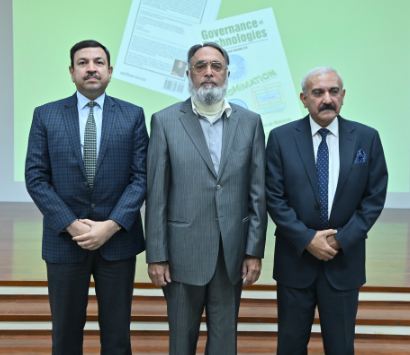ISLAMABAD, 11 DEC /DNA/ – The Centre for Aerospace & Security Studies (CASS), Islamabad, organised the launch of Azhar Zia-ur-Rehman’s new book, ‘Governance of Technologies in Industrie 4.0 and Society 5.0,’ which focuses on addressing challenges and strategies for technology governance in the modern era.
In his opening talk, Air Commodore Raza Haider (Retd), Director at CASS, highlighted the transformative impact of emerging technologies on aerospace, emphasising the critical role of drones, AI, and space economy advancements. He discussed cutting-edge innovations such as swarm drones, stealth capabilities, and generative AI applications in cybersecurity and aerospace. Stressing the significance of digital transformation, he outlined the need for policies fostering STEM education, digital startups, and industry digitisation in Pakistan to remain competitive in the global arena.
The author of the book, Mr Azhar Zia-ur-Rehman, an international governance consultant, outlined the need for structured governance frameworks to manage the risks and opportunities presented by emerging technologies. He explained his methodology for navigating digital ecosystems, focusing on aligning technology with strategic organisational goals through the DIGI4MATION, FOURAMEWORK and the PENTRIUM Model, emphasising the need for synergy among diverse technologies. Furthermore, he stressed the importance of governance frameworks that ensure ethical practices, particularly in fields such as Artificial Intelligence and biotechnology, to mitigate risks and promote responsible innovation.
President of CASS, Islamabad, Air Marshal Javaid Ahmed (Retd) delivered concluding remarks and congratulated the author on his publication. He underscored the critical need for integrating governance practices with technology, highlighting that organisations must develop systems enabling the effective and ethical use of emerging technologies to stay competitive in today’s rapidly evolving landscape.
The launch concluded with a discussion where participants explored how industries and governments can use the insights from the book to adapt to technological changes and strengthen governance systems.












